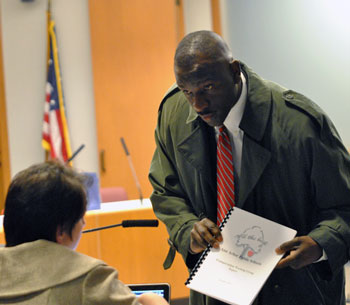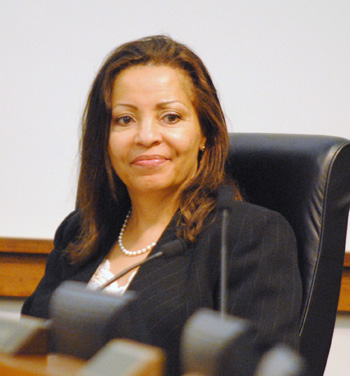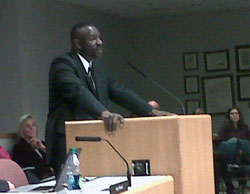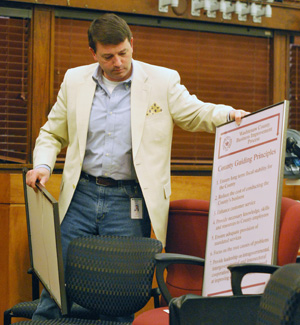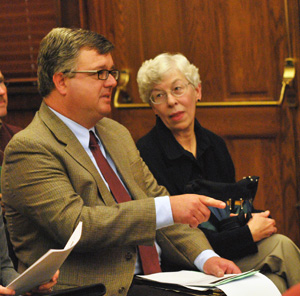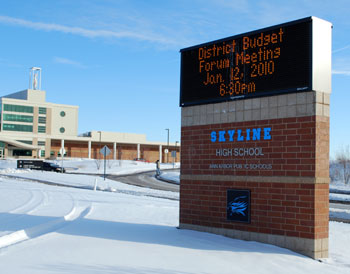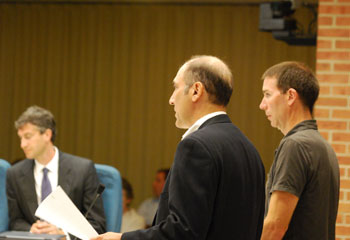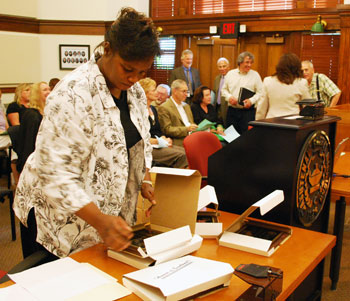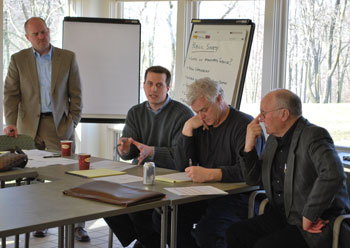Editor’s note: The Ann Arbor city council has held two retreats to discuss the city’s FY 2012 budget – one in early December 2010 and another in early January 2011. A summary of the material covered in those retreats is provided in previous Chronicle coverage: “Ann Arbor: Engaging the FY 2012 Budget.”
Leading up to the city administrator’s proposed budget in April, the city council is also holding a series of work sessions on the budget. Their typical scheduling pattern is for the weeks between council meetings. That was the case on Jan. 31, 2011 when the council held its budget work session on the community services area, which includes human services, parks and planning. Another session was held on Feb. 7, prior to the council’s regular meeting, regarding the 15th District Court. A report on the Feb. 14, 2011 session, which focused on police and fire, will follow.
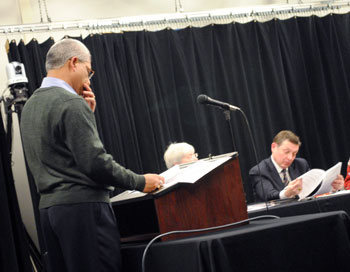
At the podium is community services area administrator Sumedh Bahl. Partially obscured by the podium is councilmember Marcia Higgins (Ward 4). Leafing through the budget impact sheets that the council had been given just prior to the meeting is Stephen Rapundalo (Ward 2). (Photo by the writer.)
The Ann Arbor city council’s budget work session on Jan. 31, 2011 covered a broad range of topics – from the city’s affordable housing stock, to planning and development, to parks and recreation (including golf courses), to human services funding. All these issues fall under the city’s community services area, which is led by Sumedh Bahl.
In a budget year where maintaining the same level of activity in every department is projected to result in a $2.4 million shortfall, city departments have been given reduction targets between 2.5% and 4%. Targets vary across departments depending on health care costs for employees in those departments.
So at their work session, councilmembers heard from heads of individual departments about the specific ways those targets might be met.
For example, Mary Jo Callan, who’s head of the city/county office of community development, told councilmembers that an unrealized $98,000 federal grant would pose an additional challenge. All other things being equal, Callan would meet the reduction target by reducing the city’s allocation to nonprofit human services agencies by $116,714 – from $1,275,744 to $1,159,030. The budget is planned in two-year cycles, even though it’s adopted just one year at a time, so Callan’s reduction strategy for next year’s FY 2013 budget would be to reduce the nonprofit allocation by an additional $48,700.
The planning department plans to meet its reduction target in part by charging the construction fund for 10% of the historic district coordinator’s time, factoring in projected revenue increases due to increased development activity, and leaving a rental housing inspector position vacant. The rental housing inspection activity would be maintained at appropriate levels by using construction inspectors for rental housing inspections as needed.
The city’s housing commission – which maintains more than 350 units of public housing throughout the city – is not proposing to meet reduction targets, but rather to hire what officials say are two crucially needed positions: a financial analyst and a facilities maintenance manager, which together are expected to cost an additional $154,000 per year.
Parks and recreation would meet their targets in part through savings derived from energy improvements that have been made to various recreational facilities over the past few years.
The council focused some of its session on the city’s golf courses, with a council consensus seeming to emerging that for the next two years, the council will be content to stick with the status quo – operating the Leslie Park and Huron Hills facilities as golf courses, and not changing them to other uses.
But the council was also asked to consider a question on which it could be harder to achieve consensus: Should the city continue to help fund park operations, as it has for the last four years, by tapping the city’s general fund reserve for $287,000 annually? The history of the issue dates back to the parks capital improvements and maintenance millage, which was approved in 2006, and which was followed by the council’s approval of its FY 2008 budget the next spring.
That history is rooted partly in a question that the city’s CFO, Tom Crawford, addressed in a straightforward fashion at the work session: What exactly does it mean for a department to have a budget reduction target of 2.5%? [Full Story]




